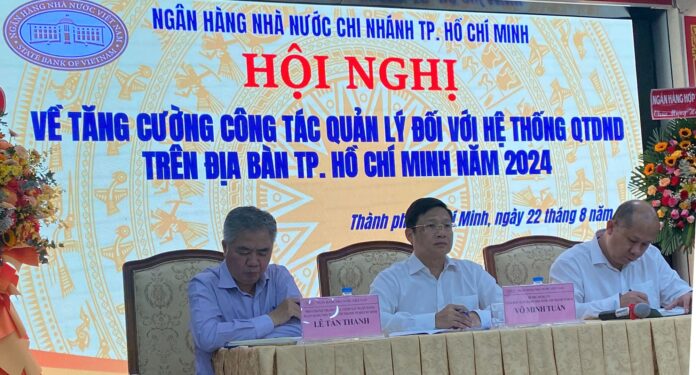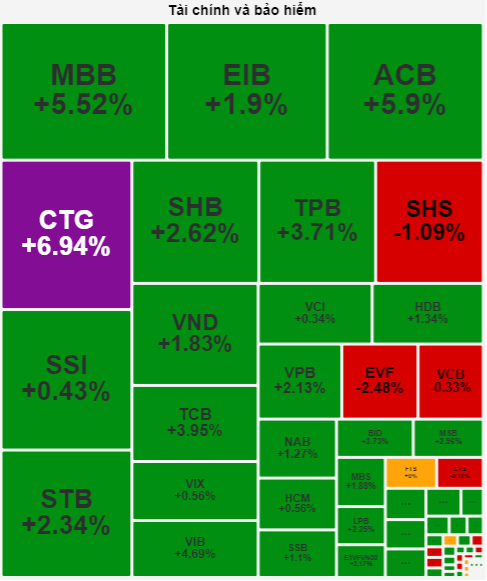On August 22, the State Bank of Vietnam (SBV) – Ho Chi Minh City Branch organized a conference to enhance the management of the city’s People’s Credit Funds (PCFs) in 2024.

Mr. Vo Minh Tuan (center) – Director of SBV’s Ho Chi Minh City Branch instructed the PCFs to streamline their operating areas and improve service quality to achieve higher rankings.
Mr. Vo Minh Tuan, Director of SBV’s Ho Chi Minh City Branch, assessed that the 19 PCFs in the city have been operating in compliance with legal regulations and closely following their restructuring plans. However, some issues and violations have emerged, such as internal conflicts and a lack of unity in governance and management, which have led to violations in operations and a decline in the Funds’ performance indicators.
According to the PCFs, in the first half of 2024, economic difficulties and job losses reduced people’s income and significantly decreased the demand for loans compared to the same period last year.
The PCF is a collective economic model in the banking sector, operating closely with local authorities to support small businesses and individual households, contributing to poverty reduction, improving livelihoods, and curbing loan sharks. However, the Funds face intense competition from commercial banks, finance companies, and financial technology companies (fintechs) that have superior human resources, technology, service quality, and brand recognition.
Mr. Trinh Van Sang, Director of Dong Sai Gon PCF, shared that the Fund has developed an app to facilitate customer deposits and loans and is working towards a loan management software solution.
Dong Sai Gon PCF proposed that the Vietnam Cooperative Bank (Co.opBank) provide more favorable conditions for the Funds to expand overdraft lending. They also requested the SBV to relax the regulations regarding related parties in the lending regulations, as the current limit of 1% of capital is challenging for small Funds, making it difficult to provide loans over VND 100 million.
According to statistics from SBV’s Ho Chi Minh City Branch, as of June 30, 2024, the total mobilized capital of PCFs in Ho Chi Minh City reached VND 1,883 billion, an increase of 4.3% compared to the end of 2023. Credit growth was limited, reaching VND 1,525 billion, a modest increase of 2.5% compared to the end of 2023. Meanwhile, deposits at the Cooperative Bank reached VND 559 billion, a significant rise of 10.1% compared to the previous year.

Ms. Nguyen Thi Thuy Oanh, Chairwoman of Tay Sai Gon PCF, pointed out that the complex loan eligibility requirements make it challenging for people to access much-needed capital.
Ms. Nguyen Thi Thuy Oanh, Chairwoman of Tay Sai Gon PCF, shared that the Fund operates in three communes (Vinh Loc A, Vinh Loc B, and Pham Van Hai) and always adheres to the principle of mutual support among members. The Fund aims to assist members in effectively carrying out production, business, and service activities and improving their livelihoods, contributing to poverty reduction, curbing loan sharks, and creating jobs for members.
The demand for capital among individuals and households for production and business development is enormous. However, according to the PCF’s lending nature, borrowers must have permanent or temporary residence registration and live and produce in the locality to be eligible to mortgage or pledge assets for loans.
Unfortunately, most of the population in the area served by Tay Sai Gon PCF are migrants with only temporary residence registration and no permanent residence (“red book”). This makes it challenging for them to obtain loans when needed, negatively impacting their livelihoods and the Fund’s operations.
Mr. Luong Xuan Vu, Director of Co.opBank’s Ho Chi Minh City Branch, suggested that small-scale PCFs focus on technology investment. Co.opBank will guide the Funds in digital transformation and investing in core banking solutions to reduce costs and enable the provision of suitable digital banking services for this customer segment.
At the conference, Mr. Vo Minh Tuan, Director of SBV’s Ho Chi Minh City Branch, answered the PCFs’ questions and advised them to closely follow the directions of the SBV, comply with legal regulations, and ensure safe operations. He also reminded them about the Law on Credit Institutions, which took effect on July 1, 2024, and suggested that the Funds review and update their policies accordingly.
Colonel Nguyen Phuoc Thuong, Head of the Economic Security Department of Ho Chi Minh City Police, assessed that the financial and banking situation in the city has been relatively stable. However, he proposed early warning mechanisms for the PCFs’ operations to ensure their safety and effectiveness.
Proposed Planning for Adding 2 New Cities in Ho Chi Minh City
According to Architect Ngô Viết Nam Sơn, Ho Chi Minh City should consider planning two cities within the city in the south and north.
Three Economic Growth Scenarios for Ho Chi Minh City in Q1 2024
At the socio-economic meeting reviewing the results of January and setting the goals for February 2024, held this morning (1/2), the Ho Chi Minh City Institute for Research and Development has presented three economic growth scenarios for the first quarter of Ho Chi Minh City.




















